Report: Entrepreneurship and Small Business Management, UK Context
VerifiedAdded on 2020/07/22
|19
|5668
|38
Report
AI Summary
This report delves into the multifaceted world of entrepreneurship and small business management, examining various types of entrepreneurial ventures, including small business, scalable, large company, and social entrepreneurship, and their relation to different typologies like serial and social entrepreneurs. It analyzes the similarities and differences between these types, focusing on the impact of micro and small businesses on the economy, particularly in the UK context, highlighting their contributions to GDP, job creation, and innovation. The report also explores the importance of startups and small businesses in fostering social and economic growth, alongside the traits and characteristics of successful entrepreneurs, and the factors that can either foster or hinder entrepreneurial behavior. The report also touches on the impact of micro and small businesses on the economy, and concludes by summarizing key findings and providing insights into the dynamic nature of entrepreneurship.

ENTREPRENEURSHIP
AND
SMALL BUSINESS
MANAGEMENT
AND
SMALL BUSINESS
MANAGEMENT
Paraphrase This Document
Need a fresh take? Get an instant paraphrase of this document with our AI Paraphraser
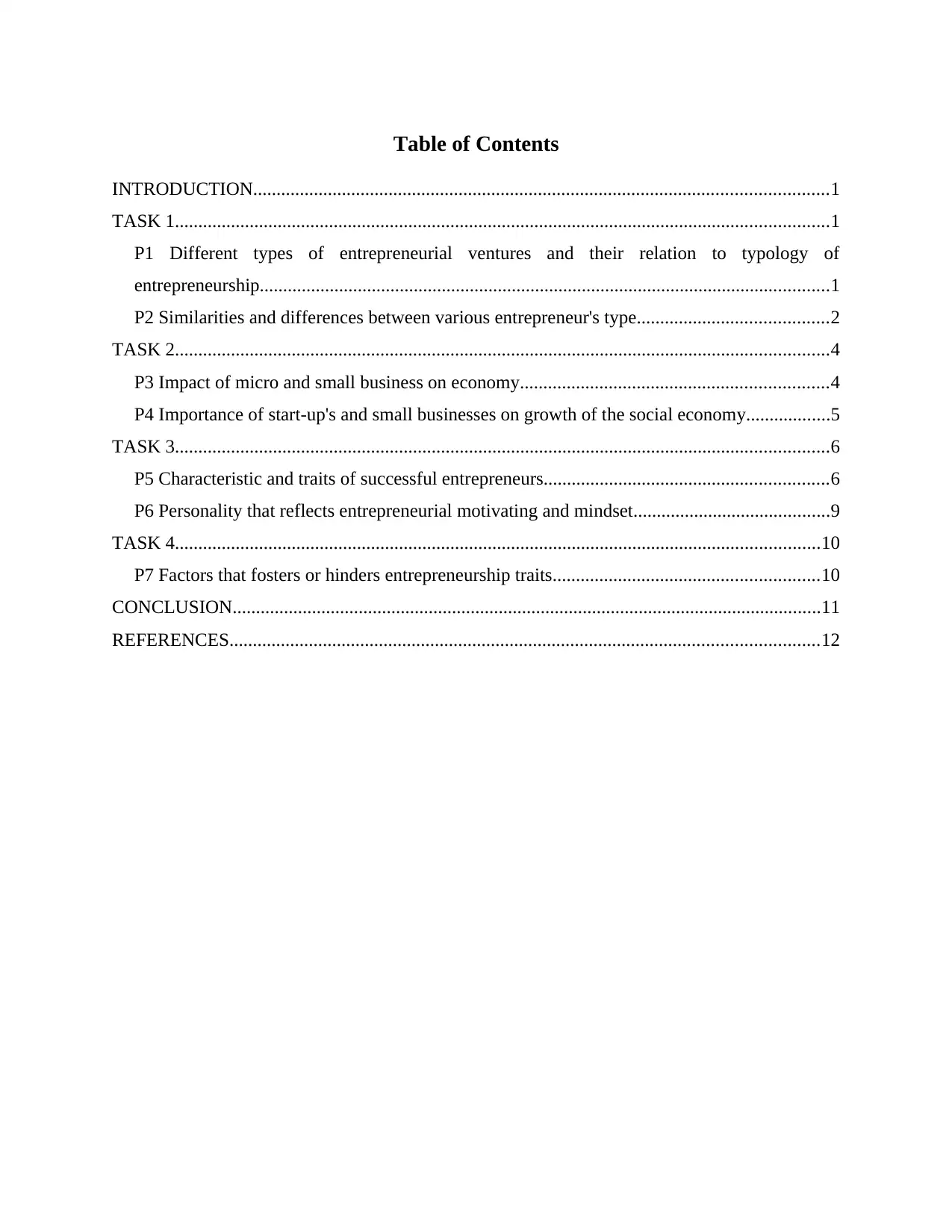
Table of Contents
INTRODUCTION...........................................................................................................................1
TASK 1............................................................................................................................................1
P1 Different types of entrepreneurial ventures and their relation to typology of
entrepreneurship..........................................................................................................................1
P2 Similarities and differences between various entrepreneur's type.........................................2
TASK 2............................................................................................................................................4
P3 Impact of micro and small business on economy..................................................................4
P4 Importance of start-up's and small businesses on growth of the social economy..................5
TASK 3............................................................................................................................................6
P5 Characteristic and traits of successful entrepreneurs.............................................................6
P6 Personality that reflects entrepreneurial motivating and mindset..........................................9
TASK 4..........................................................................................................................................10
P7 Factors that fosters or hinders entrepreneurship traits.........................................................10
CONCLUSION..............................................................................................................................11
REFERENCES..............................................................................................................................12
INTRODUCTION...........................................................................................................................1
TASK 1............................................................................................................................................1
P1 Different types of entrepreneurial ventures and their relation to typology of
entrepreneurship..........................................................................................................................1
P2 Similarities and differences between various entrepreneur's type.........................................2
TASK 2............................................................................................................................................4
P3 Impact of micro and small business on economy..................................................................4
P4 Importance of start-up's and small businesses on growth of the social economy..................5
TASK 3............................................................................................................................................6
P5 Characteristic and traits of successful entrepreneurs.............................................................6
P6 Personality that reflects entrepreneurial motivating and mindset..........................................9
TASK 4..........................................................................................................................................10
P7 Factors that fosters or hinders entrepreneurship traits.........................................................10
CONCLUSION..............................................................................................................................11
REFERENCES..............................................................................................................................12

⊘ This is a preview!⊘
Do you want full access?
Subscribe today to unlock all pages.

Trusted by 1+ million students worldwide
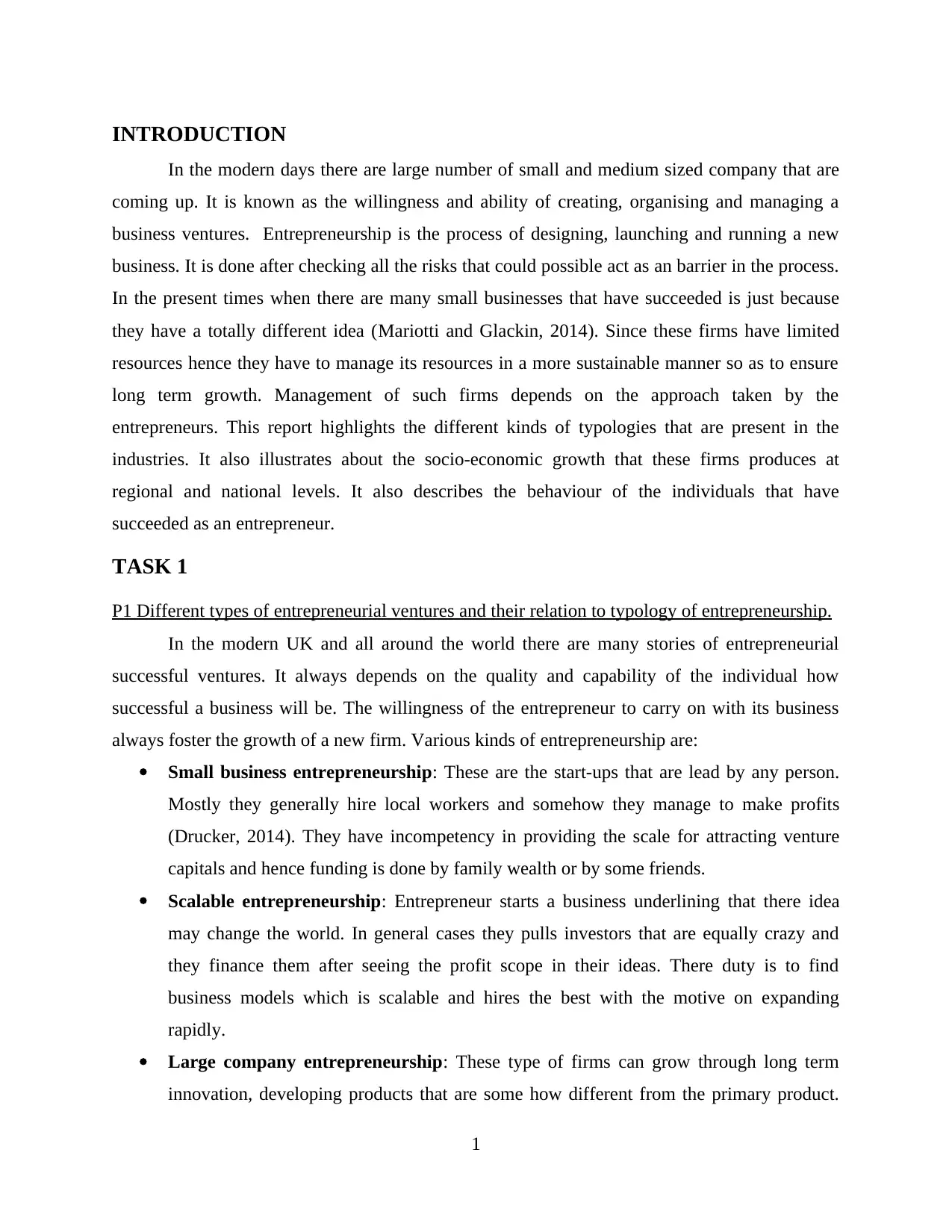
INTRODUCTION
In the modern days there are large number of small and medium sized company that are
coming up. It is known as the willingness and ability of creating, organising and managing a
business ventures. Entrepreneurship is the process of designing, launching and running a new
business. It is done after checking all the risks that could possible act as an barrier in the process.
In the present times when there are many small businesses that have succeeded is just because
they have a totally different idea (Mariotti and Glackin, 2014). Since these firms have limited
resources hence they have to manage its resources in a more sustainable manner so as to ensure
long term growth. Management of such firms depends on the approach taken by the
entrepreneurs. This report highlights the different kinds of typologies that are present in the
industries. It also illustrates about the socio-economic growth that these firms produces at
regional and national levels. It also describes the behaviour of the individuals that have
succeeded as an entrepreneur.
TASK 1
P1 Different types of entrepreneurial ventures and their relation to typology of entrepreneurship.
In the modern UK and all around the world there are many stories of entrepreneurial
successful ventures. It always depends on the quality and capability of the individual how
successful a business will be. The willingness of the entrepreneur to carry on with its business
always foster the growth of a new firm. Various kinds of entrepreneurship are:
Small business entrepreneurship: These are the start-ups that are lead by any person.
Mostly they generally hire local workers and somehow they manage to make profits
(Drucker, 2014). They have incompetency in providing the scale for attracting venture
capitals and hence funding is done by family wealth or by some friends.
Scalable entrepreneurship: Entrepreneur starts a business underlining that there idea
may change the world. In general cases they pulls investors that are equally crazy and
they finance them after seeing the profit scope in their ideas. There duty is to find
business models which is scalable and hires the best with the motive on expanding
rapidly.
Large company entrepreneurship: These type of firms can grow through long term
innovation, developing products that are some how different from the primary product.
1
In the modern days there are large number of small and medium sized company that are
coming up. It is known as the willingness and ability of creating, organising and managing a
business ventures. Entrepreneurship is the process of designing, launching and running a new
business. It is done after checking all the risks that could possible act as an barrier in the process.
In the present times when there are many small businesses that have succeeded is just because
they have a totally different idea (Mariotti and Glackin, 2014). Since these firms have limited
resources hence they have to manage its resources in a more sustainable manner so as to ensure
long term growth. Management of such firms depends on the approach taken by the
entrepreneurs. This report highlights the different kinds of typologies that are present in the
industries. It also illustrates about the socio-economic growth that these firms produces at
regional and national levels. It also describes the behaviour of the individuals that have
succeeded as an entrepreneur.
TASK 1
P1 Different types of entrepreneurial ventures and their relation to typology of entrepreneurship.
In the modern UK and all around the world there are many stories of entrepreneurial
successful ventures. It always depends on the quality and capability of the individual how
successful a business will be. The willingness of the entrepreneur to carry on with its business
always foster the growth of a new firm. Various kinds of entrepreneurship are:
Small business entrepreneurship: These are the start-ups that are lead by any person.
Mostly they generally hire local workers and somehow they manage to make profits
(Drucker, 2014). They have incompetency in providing the scale for attracting venture
capitals and hence funding is done by family wealth or by some friends.
Scalable entrepreneurship: Entrepreneur starts a business underlining that there idea
may change the world. In general cases they pulls investors that are equally crazy and
they finance them after seeing the profit scope in their ideas. There duty is to find
business models which is scalable and hires the best with the motive on expanding
rapidly.
Large company entrepreneurship: These type of firms can grow through long term
innovation, developing products that are some how different from the primary product.
1
Paraphrase This Document
Need a fresh take? Get an instant paraphrase of this document with our AI Paraphraser
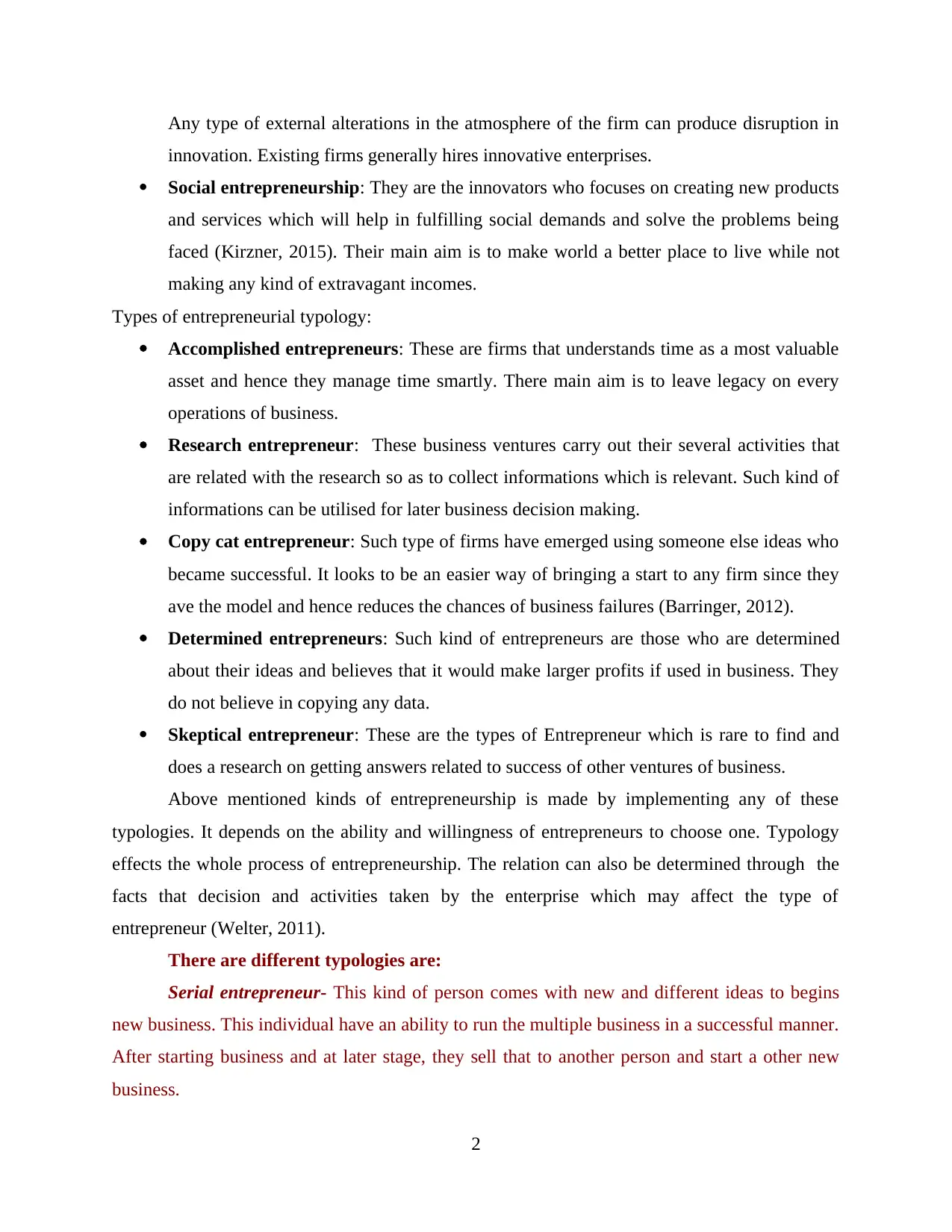
Any type of external alterations in the atmosphere of the firm can produce disruption in
innovation. Existing firms generally hires innovative enterprises.
Social entrepreneurship: They are the innovators who focuses on creating new products
and services which will help in fulfilling social demands and solve the problems being
faced (Kirzner, 2015). Their main aim is to make world a better place to live while not
making any kind of extravagant incomes.
Types of entrepreneurial typology:
Accomplished entrepreneurs: These are firms that understands time as a most valuable
asset and hence they manage time smartly. There main aim is to leave legacy on every
operations of business.
Research entrepreneur: These business ventures carry out their several activities that
are related with the research so as to collect informations which is relevant. Such kind of
informations can be utilised for later business decision making.
Copy cat entrepreneur: Such type of firms have emerged using someone else ideas who
became successful. It looks to be an easier way of bringing a start to any firm since they
ave the model and hence reduces the chances of business failures (Barringer, 2012).
Determined entrepreneurs: Such kind of entrepreneurs are those who are determined
about their ideas and believes that it would make larger profits if used in business. They
do not believe in copying any data.
Skeptical entrepreneur: These are the types of Entrepreneur which is rare to find and
does a research on getting answers related to success of other ventures of business.
Above mentioned kinds of entrepreneurship is made by implementing any of these
typologies. It depends on the ability and willingness of entrepreneurs to choose one. Typology
effects the whole process of entrepreneurship. The relation can also be determined through the
facts that decision and activities taken by the enterprise which may affect the type of
entrepreneur (Welter, 2011).
There are different typologies are:
Serial entrepreneur- This kind of person comes with new and different ideas to begins
new business. This individual have an ability to run the multiple business in a successful manner.
After starting business and at later stage, they sell that to another person and start a other new
business.
2
innovation. Existing firms generally hires innovative enterprises.
Social entrepreneurship: They are the innovators who focuses on creating new products
and services which will help in fulfilling social demands and solve the problems being
faced (Kirzner, 2015). Their main aim is to make world a better place to live while not
making any kind of extravagant incomes.
Types of entrepreneurial typology:
Accomplished entrepreneurs: These are firms that understands time as a most valuable
asset and hence they manage time smartly. There main aim is to leave legacy on every
operations of business.
Research entrepreneur: These business ventures carry out their several activities that
are related with the research so as to collect informations which is relevant. Such kind of
informations can be utilised for later business decision making.
Copy cat entrepreneur: Such type of firms have emerged using someone else ideas who
became successful. It looks to be an easier way of bringing a start to any firm since they
ave the model and hence reduces the chances of business failures (Barringer, 2012).
Determined entrepreneurs: Such kind of entrepreneurs are those who are determined
about their ideas and believes that it would make larger profits if used in business. They
do not believe in copying any data.
Skeptical entrepreneur: These are the types of Entrepreneur which is rare to find and
does a research on getting answers related to success of other ventures of business.
Above mentioned kinds of entrepreneurship is made by implementing any of these
typologies. It depends on the ability and willingness of entrepreneurs to choose one. Typology
effects the whole process of entrepreneurship. The relation can also be determined through the
facts that decision and activities taken by the enterprise which may affect the type of
entrepreneur (Welter, 2011).
There are different typologies are:
Serial entrepreneur- This kind of person comes with new and different ideas to begins
new business. This individual have an ability to run the multiple business in a successful manner.
After starting business and at later stage, they sell that to another person and start a other new
business.
2
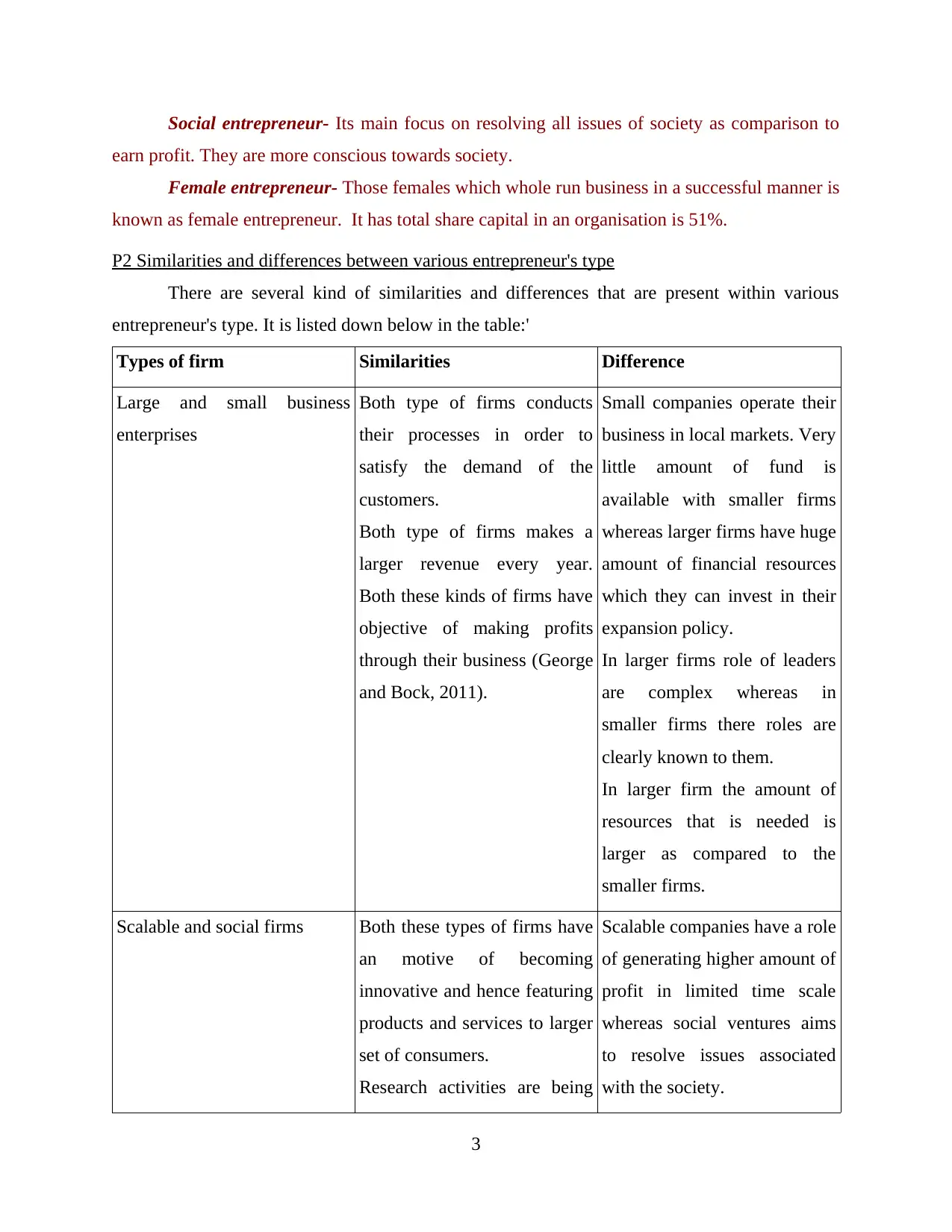
Social entrepreneur- Its main focus on resolving all issues of society as comparison to
earn profit. They are more conscious towards society.
Female entrepreneur- Those females which whole run business in a successful manner is
known as female entrepreneur. It has total share capital in an organisation is 51%.
P2 Similarities and differences between various entrepreneur's type
There are several kind of similarities and differences that are present within various
entrepreneur's type. It is listed down below in the table:'
Types of firm Similarities Difference
Large and small business
enterprises
Both type of firms conducts
their processes in order to
satisfy the demand of the
customers.
Both type of firms makes a
larger revenue every year.
Both these kinds of firms have
objective of making profits
through their business (George
and Bock, 2011).
Small companies operate their
business in local markets. Very
little amount of fund is
available with smaller firms
whereas larger firms have huge
amount of financial resources
which they can invest in their
expansion policy.
In larger firms role of leaders
are complex whereas in
smaller firms there roles are
clearly known to them.
In larger firm the amount of
resources that is needed is
larger as compared to the
smaller firms.
Scalable and social firms Both these types of firms have
an motive of becoming
innovative and hence featuring
products and services to larger
set of consumers.
Research activities are being
Scalable companies have a role
of generating higher amount of
profit in limited time scale
whereas social ventures aims
to resolve issues associated
with the society.
3
earn profit. They are more conscious towards society.
Female entrepreneur- Those females which whole run business in a successful manner is
known as female entrepreneur. It has total share capital in an organisation is 51%.
P2 Similarities and differences between various entrepreneur's type
There are several kind of similarities and differences that are present within various
entrepreneur's type. It is listed down below in the table:'
Types of firm Similarities Difference
Large and small business
enterprises
Both type of firms conducts
their processes in order to
satisfy the demand of the
customers.
Both type of firms makes a
larger revenue every year.
Both these kinds of firms have
objective of making profits
through their business (George
and Bock, 2011).
Small companies operate their
business in local markets. Very
little amount of fund is
available with smaller firms
whereas larger firms have huge
amount of financial resources
which they can invest in their
expansion policy.
In larger firms role of leaders
are complex whereas in
smaller firms there roles are
clearly known to them.
In larger firm the amount of
resources that is needed is
larger as compared to the
smaller firms.
Scalable and social firms Both these types of firms have
an motive of becoming
innovative and hence featuring
products and services to larger
set of consumers.
Research activities are being
Scalable companies have a role
of generating higher amount of
profit in limited time scale
whereas social ventures aims
to resolve issues associated
with the society.
3
⊘ This is a preview!⊘
Do you want full access?
Subscribe today to unlock all pages.

Trusted by 1+ million students worldwide
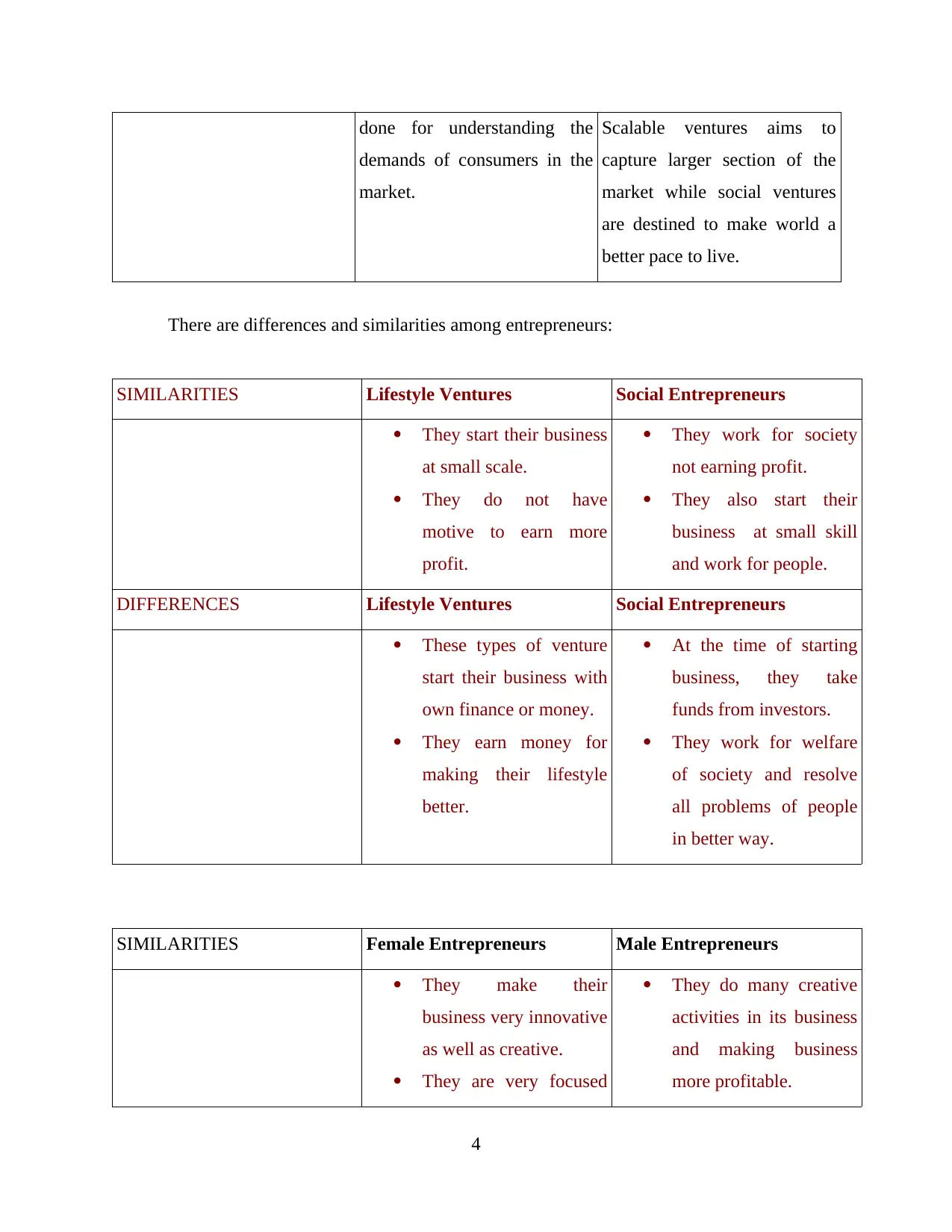
done for understanding the
demands of consumers in the
market.
Scalable ventures aims to
capture larger section of the
market while social ventures
are destined to make world a
better pace to live.
There are differences and similarities among entrepreneurs:
SIMILARITIES Lifestyle Ventures Social Entrepreneurs
They start their business
at small scale.
They do not have
motive to earn more
profit.
They work for society
not earning profit.
They also start their
business at small skill
and work for people.
DIFFERENCES Lifestyle Ventures Social Entrepreneurs
These types of venture
start their business with
own finance or money.
They earn money for
making their lifestyle
better.
At the time of starting
business, they take
funds from investors.
They work for welfare
of society and resolve
all problems of people
in better way.
SIMILARITIES Female Entrepreneurs Male Entrepreneurs
They make their
business very innovative
as well as creative.
They are very focused
They do many creative
activities in its business
and making business
more profitable.
4
demands of consumers in the
market.
Scalable ventures aims to
capture larger section of the
market while social ventures
are destined to make world a
better pace to live.
There are differences and similarities among entrepreneurs:
SIMILARITIES Lifestyle Ventures Social Entrepreneurs
They start their business
at small scale.
They do not have
motive to earn more
profit.
They work for society
not earning profit.
They also start their
business at small skill
and work for people.
DIFFERENCES Lifestyle Ventures Social Entrepreneurs
These types of venture
start their business with
own finance or money.
They earn money for
making their lifestyle
better.
At the time of starting
business, they take
funds from investors.
They work for welfare
of society and resolve
all problems of people
in better way.
SIMILARITIES Female Entrepreneurs Male Entrepreneurs
They make their
business very innovative
as well as creative.
They are very focused
They do many creative
activities in its business
and making business
more profitable.
4
Paraphrase This Document
Need a fresh take? Get an instant paraphrase of this document with our AI Paraphraser
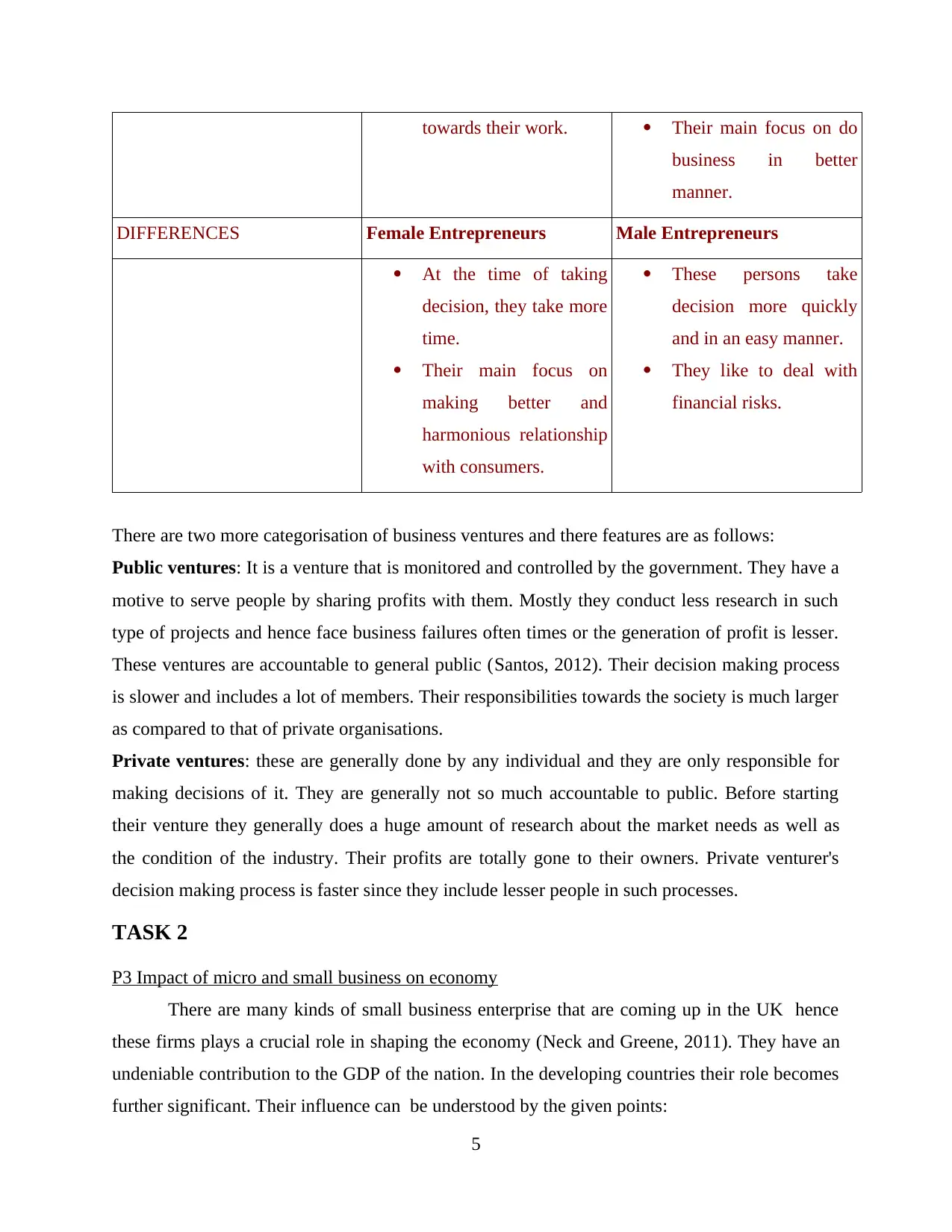
towards their work. Their main focus on do
business in better
manner.
DIFFERENCES Female Entrepreneurs Male Entrepreneurs
At the time of taking
decision, they take more
time.
Their main focus on
making better and
harmonious relationship
with consumers.
These persons take
decision more quickly
and in an easy manner.
They like to deal with
financial risks.
There are two more categorisation of business ventures and there features are as follows:
Public ventures: It is a venture that is monitored and controlled by the government. They have a
motive to serve people by sharing profits with them. Mostly they conduct less research in such
type of projects and hence face business failures often times or the generation of profit is lesser.
These ventures are accountable to general public (Santos, 2012). Their decision making process
is slower and includes a lot of members. Their responsibilities towards the society is much larger
as compared to that of private organisations.
Private ventures: these are generally done by any individual and they are only responsible for
making decisions of it. They are generally not so much accountable to public. Before starting
their venture they generally does a huge amount of research about the market needs as well as
the condition of the industry. Their profits are totally gone to their owners. Private venturer's
decision making process is faster since they include lesser people in such processes.
TASK 2
P3 Impact of micro and small business on economy
There are many kinds of small business enterprise that are coming up in the UK hence
these firms plays a crucial role in shaping the economy (Neck and Greene, 2011). They have an
undeniable contribution to the GDP of the nation. In the developing countries their role becomes
further significant. Their influence can be understood by the given points:
5
business in better
manner.
DIFFERENCES Female Entrepreneurs Male Entrepreneurs
At the time of taking
decision, they take more
time.
Their main focus on
making better and
harmonious relationship
with consumers.
These persons take
decision more quickly
and in an easy manner.
They like to deal with
financial risks.
There are two more categorisation of business ventures and there features are as follows:
Public ventures: It is a venture that is monitored and controlled by the government. They have a
motive to serve people by sharing profits with them. Mostly they conduct less research in such
type of projects and hence face business failures often times or the generation of profit is lesser.
These ventures are accountable to general public (Santos, 2012). Their decision making process
is slower and includes a lot of members. Their responsibilities towards the society is much larger
as compared to that of private organisations.
Private ventures: these are generally done by any individual and they are only responsible for
making decisions of it. They are generally not so much accountable to public. Before starting
their venture they generally does a huge amount of research about the market needs as well as
the condition of the industry. Their profits are totally gone to their owners. Private venturer's
decision making process is faster since they include lesser people in such processes.
TASK 2
P3 Impact of micro and small business on economy
There are many kinds of small business enterprise that are coming up in the UK hence
these firms plays a crucial role in shaping the economy (Neck and Greene, 2011). They have an
undeniable contribution to the GDP of the nation. In the developing countries their role becomes
further significant. Their influence can be understood by the given points:
5
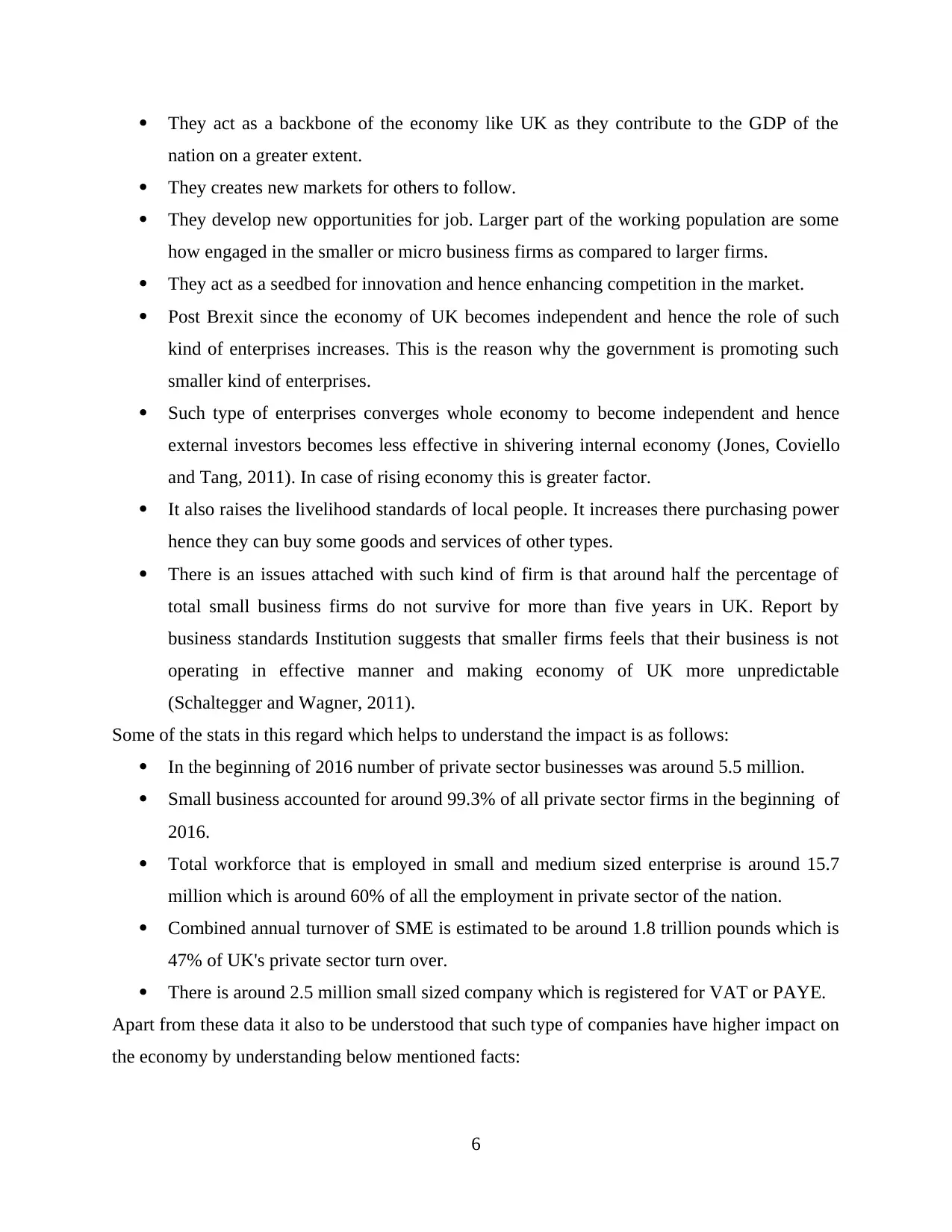
They act as a backbone of the economy like UK as they contribute to the GDP of the
nation on a greater extent.
They creates new markets for others to follow.
They develop new opportunities for job. Larger part of the working population are some
how engaged in the smaller or micro business firms as compared to larger firms.
They act as a seedbed for innovation and hence enhancing competition in the market.
Post Brexit since the economy of UK becomes independent and hence the role of such
kind of enterprises increases. This is the reason why the government is promoting such
smaller kind of enterprises.
Such type of enterprises converges whole economy to become independent and hence
external investors becomes less effective in shivering internal economy (Jones, Coviello
and Tang, 2011). In case of rising economy this is greater factor.
It also raises the livelihood standards of local people. It increases there purchasing power
hence they can buy some goods and services of other types.
There is an issues attached with such kind of firm is that around half the percentage of
total small business firms do not survive for more than five years in UK. Report by
business standards Institution suggests that smaller firms feels that their business is not
operating in effective manner and making economy of UK more unpredictable
(Schaltegger and Wagner, 2011).
Some of the stats in this regard which helps to understand the impact is as follows:
In the beginning of 2016 number of private sector businesses was around 5.5 million.
Small business accounted for around 99.3% of all private sector firms in the beginning of
2016.
Total workforce that is employed in small and medium sized enterprise is around 15.7
million which is around 60% of all the employment in private sector of the nation.
Combined annual turnover of SME is estimated to be around 1.8 trillion pounds which is
47% of UK's private sector turn over.
There is around 2.5 million small sized company which is registered for VAT or PAYE.
Apart from these data it also to be understood that such type of companies have higher impact on
the economy by understanding below mentioned facts:
6
nation on a greater extent.
They creates new markets for others to follow.
They develop new opportunities for job. Larger part of the working population are some
how engaged in the smaller or micro business firms as compared to larger firms.
They act as a seedbed for innovation and hence enhancing competition in the market.
Post Brexit since the economy of UK becomes independent and hence the role of such
kind of enterprises increases. This is the reason why the government is promoting such
smaller kind of enterprises.
Such type of enterprises converges whole economy to become independent and hence
external investors becomes less effective in shivering internal economy (Jones, Coviello
and Tang, 2011). In case of rising economy this is greater factor.
It also raises the livelihood standards of local people. It increases there purchasing power
hence they can buy some goods and services of other types.
There is an issues attached with such kind of firm is that around half the percentage of
total small business firms do not survive for more than five years in UK. Report by
business standards Institution suggests that smaller firms feels that their business is not
operating in effective manner and making economy of UK more unpredictable
(Schaltegger and Wagner, 2011).
Some of the stats in this regard which helps to understand the impact is as follows:
In the beginning of 2016 number of private sector businesses was around 5.5 million.
Small business accounted for around 99.3% of all private sector firms in the beginning of
2016.
Total workforce that is employed in small and medium sized enterprise is around 15.7
million which is around 60% of all the employment in private sector of the nation.
Combined annual turnover of SME is estimated to be around 1.8 trillion pounds which is
47% of UK's private sector turn over.
There is around 2.5 million small sized company which is registered for VAT or PAYE.
Apart from these data it also to be understood that such type of companies have higher impact on
the economy by understanding below mentioned facts:
6
⊘ This is a preview!⊘
Do you want full access?
Subscribe today to unlock all pages.

Trusted by 1+ million students worldwide
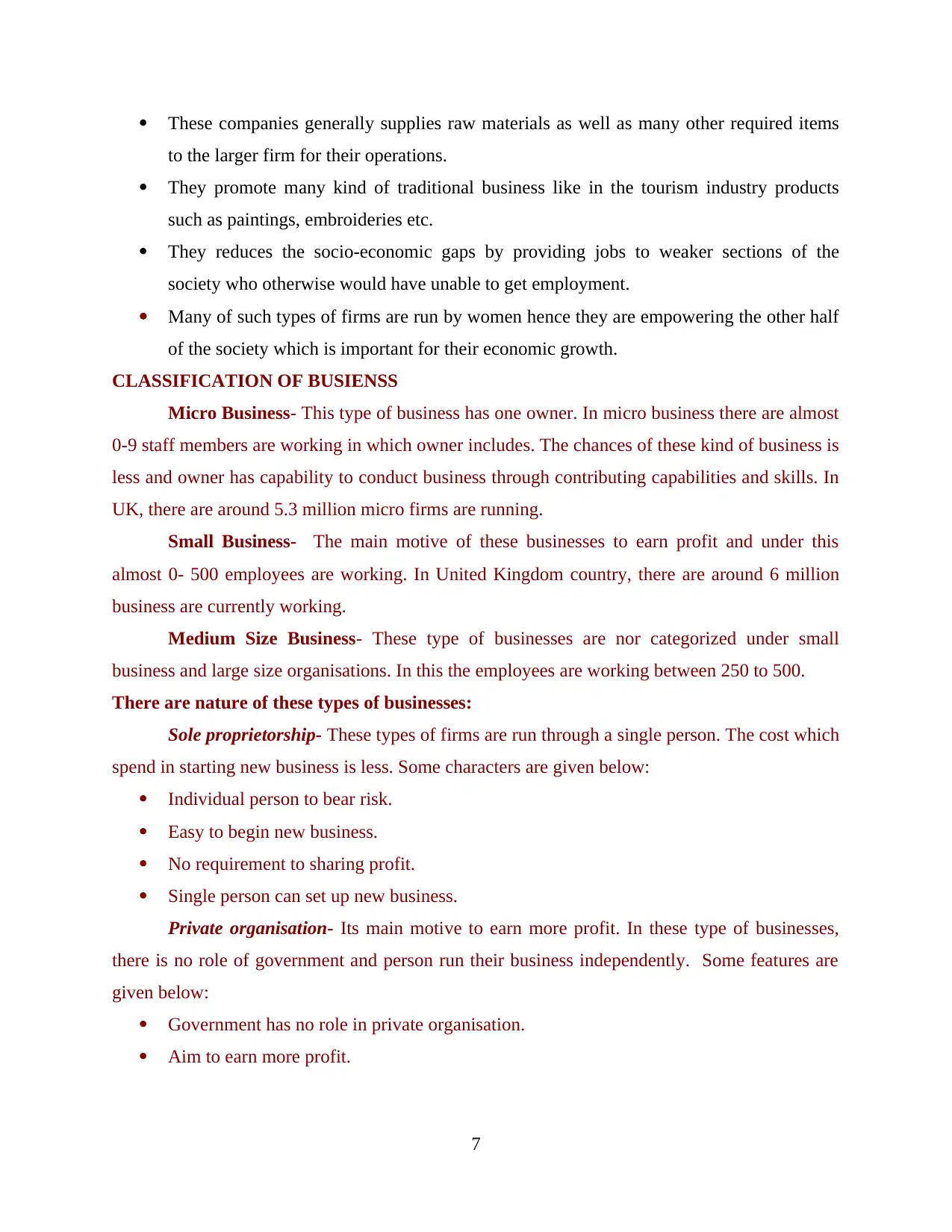
These companies generally supplies raw materials as well as many other required items
to the larger firm for their operations.
They promote many kind of traditional business like in the tourism industry products
such as paintings, embroideries etc.
They reduces the socio-economic gaps by providing jobs to weaker sections of the
society who otherwise would have unable to get employment.
Many of such types of firms are run by women hence they are empowering the other half
of the society which is important for their economic growth.
CLASSIFICATION OF BUSIENSS
Micro Business- This type of business has one owner. In micro business there are almost
0-9 staff members are working in which owner includes. The chances of these kind of business is
less and owner has capability to conduct business through contributing capabilities and skills. In
UK, there are around 5.3 million micro firms are running.
Small Business- The main motive of these businesses to earn profit and under this
almost 0- 500 employees are working. In United Kingdom country, there are around 6 million
business are currently working.
Medium Size Business- These type of businesses are nor categorized under small
business and large size organisations. In this the employees are working between 250 to 500.
There are nature of these types of businesses:
Sole proprietorship- These types of firms are run through a single person. The cost which
spend in starting new business is less. Some characters are given below:
Individual person to bear risk.
Easy to begin new business.
No requirement to sharing profit.
Single person can set up new business.
Private organisation- Its main motive to earn more profit. In these type of businesses,
there is no role of government and person run their business independently. Some features are
given below:
Government has no role in private organisation.
Aim to earn more profit.
7
to the larger firm for their operations.
They promote many kind of traditional business like in the tourism industry products
such as paintings, embroideries etc.
They reduces the socio-economic gaps by providing jobs to weaker sections of the
society who otherwise would have unable to get employment.
Many of such types of firms are run by women hence they are empowering the other half
of the society which is important for their economic growth.
CLASSIFICATION OF BUSIENSS
Micro Business- This type of business has one owner. In micro business there are almost
0-9 staff members are working in which owner includes. The chances of these kind of business is
less and owner has capability to conduct business through contributing capabilities and skills. In
UK, there are around 5.3 million micro firms are running.
Small Business- The main motive of these businesses to earn profit and under this
almost 0- 500 employees are working. In United Kingdom country, there are around 6 million
business are currently working.
Medium Size Business- These type of businesses are nor categorized under small
business and large size organisations. In this the employees are working between 250 to 500.
There are nature of these types of businesses:
Sole proprietorship- These types of firms are run through a single person. The cost which
spend in starting new business is less. Some characters are given below:
Individual person to bear risk.
Easy to begin new business.
No requirement to sharing profit.
Single person can set up new business.
Private organisation- Its main motive to earn more profit. In these type of businesses,
there is no role of government and person run their business independently. Some features are
given below:
Government has no role in private organisation.
Aim to earn more profit.
7
Paraphrase This Document
Need a fresh take? Get an instant paraphrase of this document with our AI Paraphraser
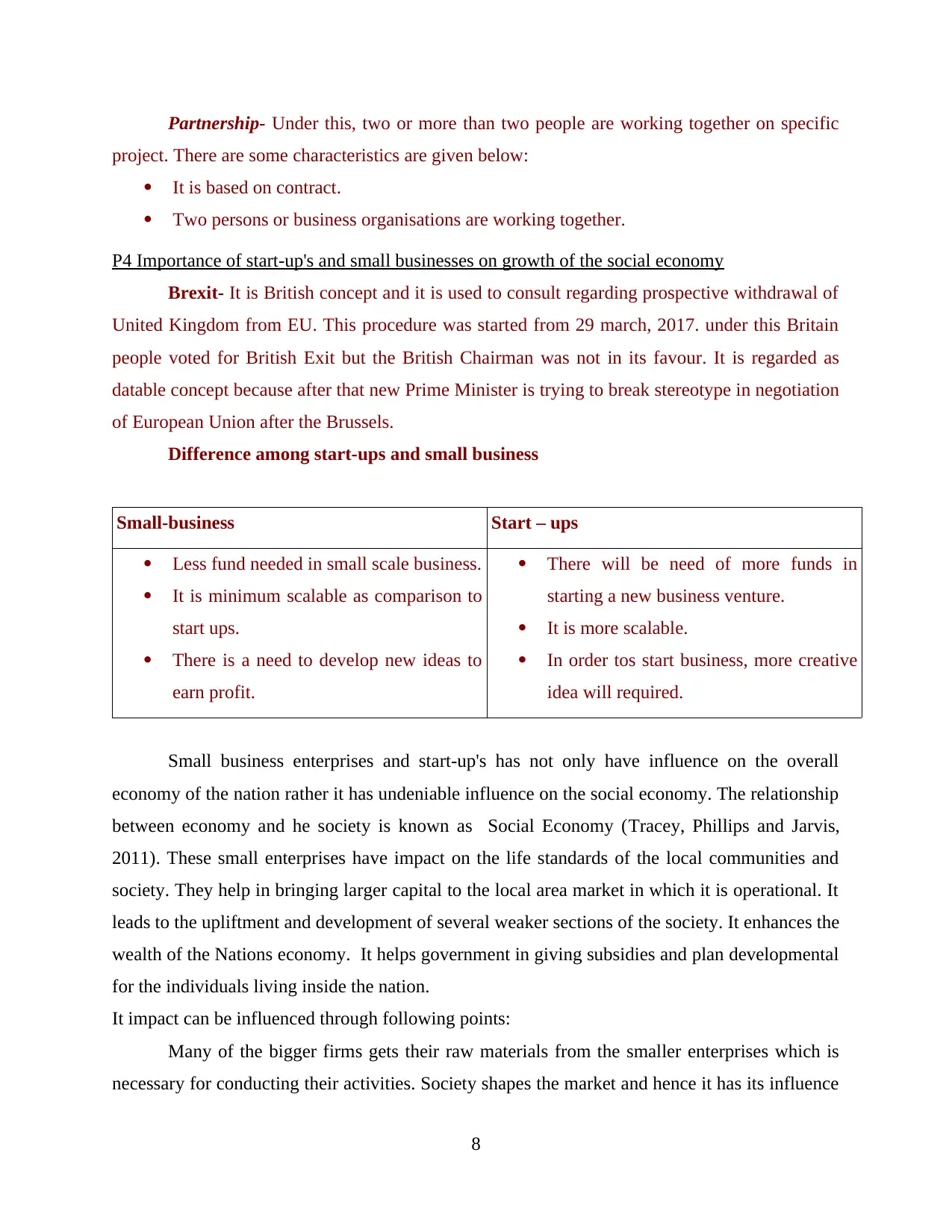
Partnership- Under this, two or more than two people are working together on specific
project. There are some characteristics are given below:
It is based on contract.
Two persons or business organisations are working together.
P4 Importance of start-up's and small businesses on growth of the social economy
Brexit- It is British concept and it is used to consult regarding prospective withdrawal of
United Kingdom from EU. This procedure was started from 29 march, 2017. under this Britain
people voted for British Exit but the British Chairman was not in its favour. It is regarded as
datable concept because after that new Prime Minister is trying to break stereotype in negotiation
of European Union after the Brussels.
Difference among start-ups and small business
Small-business Start – ups
Less fund needed in small scale business.
It is minimum scalable as comparison to
start ups.
There is a need to develop new ideas to
earn profit.
There will be need of more funds in
starting a new business venture.
It is more scalable.
In order tos start business, more creative
idea will required.
Small business enterprises and start-up's has not only have influence on the overall
economy of the nation rather it has undeniable influence on the social economy. The relationship
between economy and he society is known as Social Economy (Tracey, Phillips and Jarvis,
2011). These small enterprises have impact on the life standards of the local communities and
society. They help in bringing larger capital to the local area market in which it is operational. It
leads to the upliftment and development of several weaker sections of the society. It enhances the
wealth of the Nations economy. It helps government in giving subsidies and plan developmental
for the individuals living inside the nation.
It impact can be influenced through following points:
Many of the bigger firms gets their raw materials from the smaller enterprises which is
necessary for conducting their activities. Society shapes the market and hence it has its influence
8
project. There are some characteristics are given below:
It is based on contract.
Two persons or business organisations are working together.
P4 Importance of start-up's and small businesses on growth of the social economy
Brexit- It is British concept and it is used to consult regarding prospective withdrawal of
United Kingdom from EU. This procedure was started from 29 march, 2017. under this Britain
people voted for British Exit but the British Chairman was not in its favour. It is regarded as
datable concept because after that new Prime Minister is trying to break stereotype in negotiation
of European Union after the Brussels.
Difference among start-ups and small business
Small-business Start – ups
Less fund needed in small scale business.
It is minimum scalable as comparison to
start ups.
There is a need to develop new ideas to
earn profit.
There will be need of more funds in
starting a new business venture.
It is more scalable.
In order tos start business, more creative
idea will required.
Small business enterprises and start-up's has not only have influence on the overall
economy of the nation rather it has undeniable influence on the social economy. The relationship
between economy and he society is known as Social Economy (Tracey, Phillips and Jarvis,
2011). These small enterprises have impact on the life standards of the local communities and
society. They help in bringing larger capital to the local area market in which it is operational. It
leads to the upliftment and development of several weaker sections of the society. It enhances the
wealth of the Nations economy. It helps government in giving subsidies and plan developmental
for the individuals living inside the nation.
It impact can be influenced through following points:
Many of the bigger firms gets their raw materials from the smaller enterprises which is
necessary for conducting their activities. Society shapes the market and hence it has its influence
8
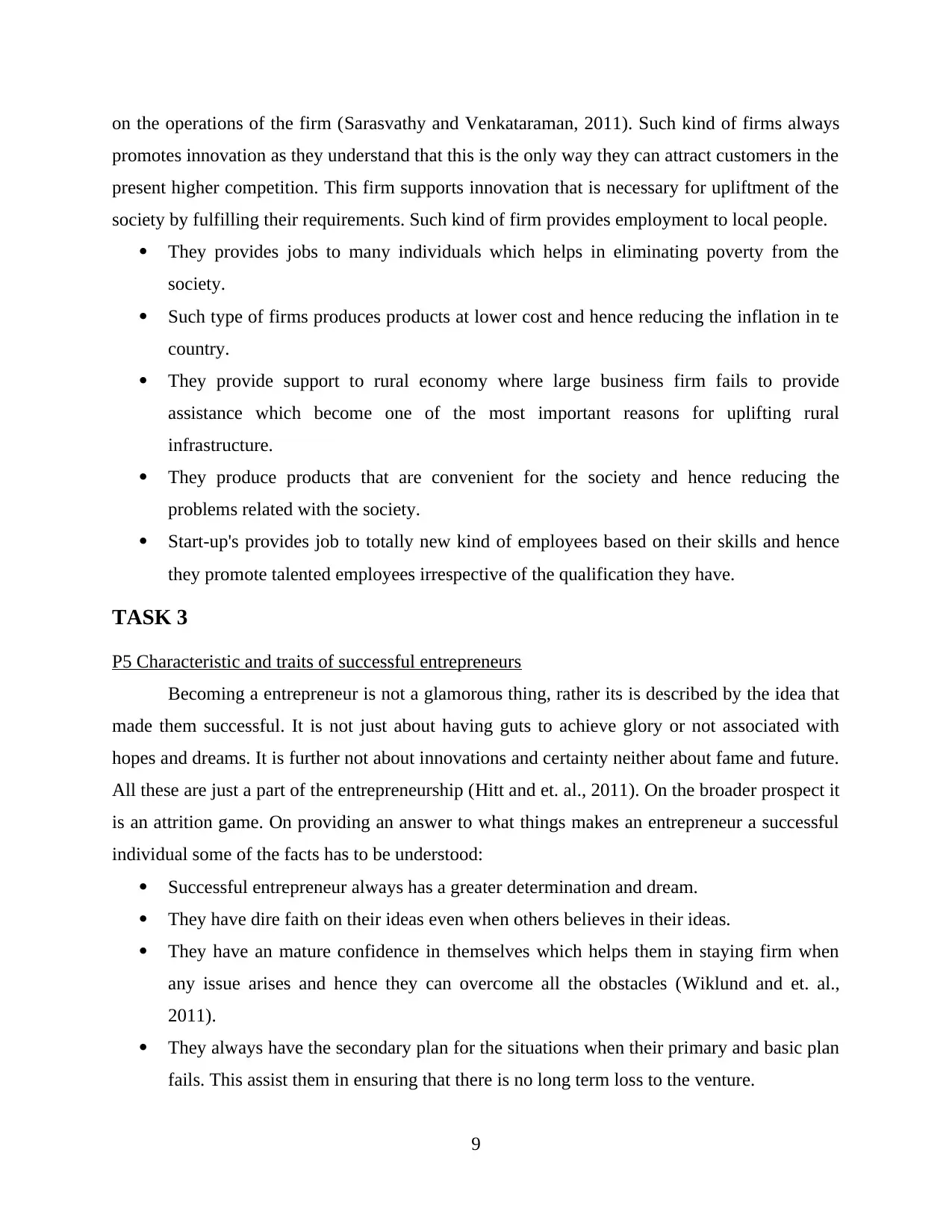
on the operations of the firm (Sarasvathy and Venkataraman, 2011). Such kind of firms always
promotes innovation as they understand that this is the only way they can attract customers in the
present higher competition. This firm supports innovation that is necessary for upliftment of the
society by fulfilling their requirements. Such kind of firm provides employment to local people.
They provides jobs to many individuals which helps in eliminating poverty from the
society.
Such type of firms produces products at lower cost and hence reducing the inflation in te
country.
They provide support to rural economy where large business firm fails to provide
assistance which become one of the most important reasons for uplifting rural
infrastructure.
They produce products that are convenient for the society and hence reducing the
problems related with the society.
Start-up's provides job to totally new kind of employees based on their skills and hence
they promote talented employees irrespective of the qualification they have.
TASK 3
P5 Characteristic and traits of successful entrepreneurs
Becoming a entrepreneur is not a glamorous thing, rather its is described by the idea that
made them successful. It is not just about having guts to achieve glory or not associated with
hopes and dreams. It is further not about innovations and certainty neither about fame and future.
All these are just a part of the entrepreneurship (Hitt and et. al., 2011). On the broader prospect it
is an attrition game. On providing an answer to what things makes an entrepreneur a successful
individual some of the facts has to be understood:
Successful entrepreneur always has a greater determination and dream.
They have dire faith on their ideas even when others believes in their ideas.
They have an mature confidence in themselves which helps them in staying firm when
any issue arises and hence they can overcome all the obstacles (Wiklund and et. al.,
2011).
They always have the secondary plan for the situations when their primary and basic plan
fails. This assist them in ensuring that there is no long term loss to the venture.
9
promotes innovation as they understand that this is the only way they can attract customers in the
present higher competition. This firm supports innovation that is necessary for upliftment of the
society by fulfilling their requirements. Such kind of firm provides employment to local people.
They provides jobs to many individuals which helps in eliminating poverty from the
society.
Such type of firms produces products at lower cost and hence reducing the inflation in te
country.
They provide support to rural economy where large business firm fails to provide
assistance which become one of the most important reasons for uplifting rural
infrastructure.
They produce products that are convenient for the society and hence reducing the
problems related with the society.
Start-up's provides job to totally new kind of employees based on their skills and hence
they promote talented employees irrespective of the qualification they have.
TASK 3
P5 Characteristic and traits of successful entrepreneurs
Becoming a entrepreneur is not a glamorous thing, rather its is described by the idea that
made them successful. It is not just about having guts to achieve glory or not associated with
hopes and dreams. It is further not about innovations and certainty neither about fame and future.
All these are just a part of the entrepreneurship (Hitt and et. al., 2011). On the broader prospect it
is an attrition game. On providing an answer to what things makes an entrepreneur a successful
individual some of the facts has to be understood:
Successful entrepreneur always has a greater determination and dream.
They have dire faith on their ideas even when others believes in their ideas.
They have an mature confidence in themselves which helps them in staying firm when
any issue arises and hence they can overcome all the obstacles (Wiklund and et. al.,
2011).
They always have the secondary plan for the situations when their primary and basic plan
fails. This assist them in ensuring that there is no long term loss to the venture.
9
⊘ This is a preview!⊘
Do you want full access?
Subscribe today to unlock all pages.

Trusted by 1+ million students worldwide
1 out of 19
Related Documents
Your All-in-One AI-Powered Toolkit for Academic Success.
+13062052269
info@desklib.com
Available 24*7 on WhatsApp / Email
![[object Object]](/_next/static/media/star-bottom.7253800d.svg)
Unlock your academic potential
Copyright © 2020–2026 A2Z Services. All Rights Reserved. Developed and managed by ZUCOL.




![Entrepreneurship and Small Business Impact Report - [University Name]](/_next/image/?url=https%3A%2F%2Fdesklib.com%2Fmedia%2Fimages%2Fwj%2Fd1f42599211847658d3fd556aa563fa5.jpg&w=256&q=75)
